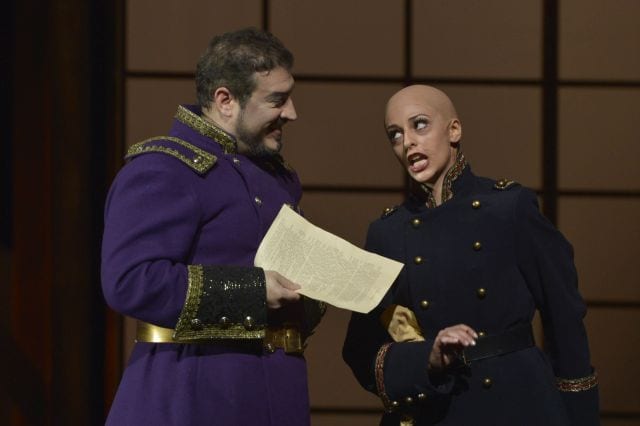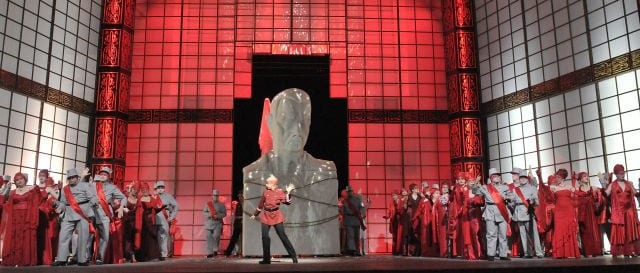This is one of Verdi’s most neglected of his great operas. However, this production makes the case well for reviving Un Ballo in Maschera (A Masked Ball) more often. Because of censorship during of that period (the 1850s), the libretto had to be modified more than once. The plot concerns the 1792 assassination of King Gustav III of Sweden, who was shot while attending a masked ball. Even some sixty years later, the memories of that event were still raw. Thus, the story was conveniently switched to the Puritan era of New England and became the assassination of The British Governor of Massachusetts set in Boston.
The basic story and its themes of love, honour, and self-denial out of a sense of moral duty and vengeful jealousy are not only totally comprehensible in the new context, but made just as powerful by one of Verdi’s middle-period, mature scores. Un Ballo in Maschera is also noteworthy for several breakthroughs: technically, in his mastery and rethinking of the orchestral palette and sonorities; and in the elements of satire and even outright comedy that are introduced into the opera to be amplified in La Forza del Destino (The Power of Fate) and then come to full fruition in Falstaff.
Verdi was not always lugubrious! The score has amazing energy and lyricism and some of the best and most memorable tunes that Verdi ever wrote. It is also brilliant for its ability to characterise the characters musically.
Riccardo, the Governor of Boston, is in love with Amelia, the wife of his closest aide Renato. At first, Renato saves Riccardo’s life by warning him of an upcoming murder plot. Later on, when Renato discovers his wife’s claimed affair with the Governor, he decides to join a group of conspirators and take the Governor’s life with his own hands. Only after he stabs him to death during a masked ball does he realize that although Riccardo was indeed in love with Amelia, and she had feelings for him, both she and the Governor kept their honour.
Riccardo’s fecklessness, Ulrica’s sinister mystical aspects, Amelia’s suffering and the conflict between her feelings for Riccardo and her sense of duty to and also love for her husband, Renato, are all convincing because of the music and the characters of the page. Oscar (a travesty role for a soubrettes soprano that is Verdi’s answer to Cherubino) and the conspirators, Sam and Tom, are both troubling at times and quite comic as well. This is a rich score for a complex and fascinating tale.

And though this is one of Verdi’s least known and least performed of his mature operas, it has a score that is consistently beautiful and innovative, with some of his most interesting orchestration. The characters are absolutely perfectly delineated by their music, including even the shallow pageboy, Oscar, sung in travesty by a soprano. This is one of Verdi’s greatest artistic achievements and yet it is also one of the most difficult operas to interpret.
Tenor Valentyn Dutiuk’s Riccardo shines through the score and compensated for his weak theatrical performance. He may be too young for the role and made only a marginal contribution to the excitement you expect to get from both a lover and a monarch. Ira Bertman shone in the role of Amelia, a perfect choice and a great performance both dramatically and vocally. Also impressive was Hila Baggio in the demanding role of Oscar, the Governor’s page. Ionut Pascu, a familiar and always welcome voice on the stage of the Israeli Opera, is an impressive Renato. Also to be commended for their performances are Agunda Kulaeva as the fortune-teller Ulrica, and Carlo Striuli as Samuel, one of the conspirators.
The Israeli Opera Chorus did marvelously, one of its best performances in memory. Daniel Oren and the Orchestra demonstrated again that with Verdi they truly feel at home. Beautiful music, so well performed.

